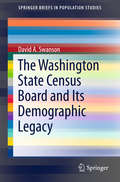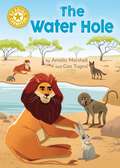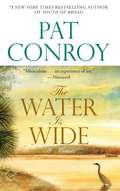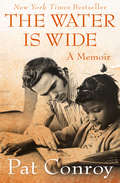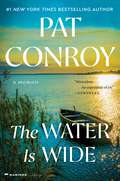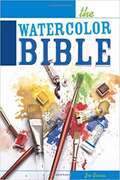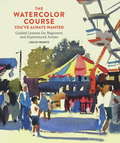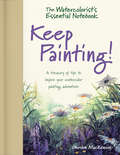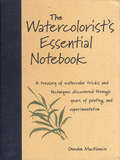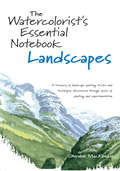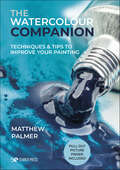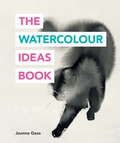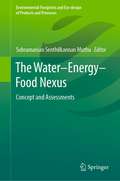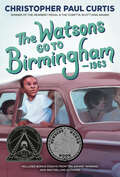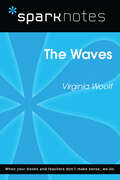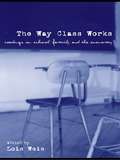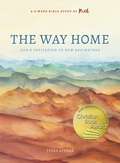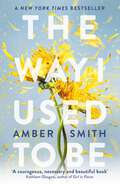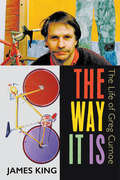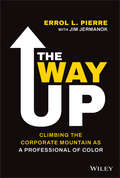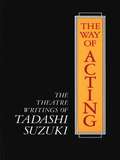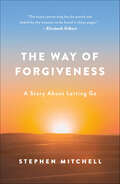- Table View
- List View
The Washington State Census Board and Its Demographic Legacy
by David A. SwansonThis book tells the story of how a group of far-sighted, academic researchers came to the aid of an overwhelmed local government. It details the history of the Washington State Census Board, which began in 1943 as part of an emergency measure during a massive wartime in-migration. The narrative also shows the demographic legacy of the Board and, ultimately, provides an unforgettable look into the creation and evolution of applied demography. Inside, readers will discover how Washington State struggled to keep up with the unexpected needs for housing, transportation, schools, and public utilities for the hundreds of thousands of migrants who came to work in industries that practically developed overnight with the mobilization for World War II. The author recounts how Professor Calvin F. Schmid, who led the Washington State Census Board, and his team developed methods of population estimation that are still in use today. In the process, the narrative reveals how population figures were gathered, compared, and projected at a time when the hand calculator was considered cutting-edge technology. The book also details how methods were refined and improved over time as well as how those involved developed new ways to obtain and, more importantly, utilize the information. With the aid of archived materials, personal interviews, and rich personal accounts, this book will inform and inspir e practicing and academic demographers as well as planners, policy-makers, historians, and interested readers.
The Water Hole: Independent Reading Gold 9 (Reading Champion #1076)
by Amelia MarshallThis story is part of Reading Champion, a series carefully linked to book bands to encourage independent reading skills, developed with Dr Sue Bodman and Glen Franklin of UCL Institute of Education (IOE)Reading Champion offers independent reading books for children to practise and reinforce their developing reading skills.Fantastic, original stories are accompanied by engaging artwork and a reading activity. Each book has been carefully graded so that it can be matched to a child's reading ability, encouraging reading for pleasure. Perfect for 5-7 year olds or those reading book band orange.
The Water Is Wide: A Memoir
by Pat ConroyThe book is Pat Conroy's extraordinary drama based on his own experience the true story of a man who gave a year of his life to an island and the new life its people gave him.
The Water Is Wide: A Memoir
by Pat ConroyThe bestselling Pat Conroy memoir--now available as an ebookThe moving story of a young teacher's experience on an island forgotten by the worldThough the children of Yamacraw Island live less than two miles from the coast of South Carolina, they can't name the president or the ocean that surrounds them. Many can't sign their names. Most can't read or write--they're unable to reach their potential to grow and learn because they have been failed by their school district and handicapped by their poverty and isolation. But with the arrival of an eager young teacher, their prospects begin to brighten.Based on Pat Conroy's experiences teaching elementary school for a year on South Carolina's Daufuskie Island, The Water Is Wide is a revealing portrait of the inequalities of the American education system and a powerful story of the group of children that changed one man's life forever.
The Water Is Wide: A Memoir
by Pat Conroy“A powerfully moving book . . . You will laugh, you will weep, you will be proud and you will rail.” —Charleston News and CourierYamacraw Island was haunting, nearly deserted, and beautiful. Separated from the mainland of South Carolina by a wide tidal river, it was accessible only by boat. But for the handful of families that lived on Yamacraw, America was a world away. For years these families lived proudly from the sea until waste from industry destroyed the oyster beds essential to their very existence. Already poor, they knew they would have to face an uncertain future unless, somehow, they learned a new life. But they needed someone to teach them, and their rundown schoolhouse had no teacher.The Water Is Wide is Pat Conroy’s extraordinary memoir based on his experience as one of two teachers in a two-room schoolhouse, working with children the world had pretty much forgotten. It was a year that changed his life, and one that introduced a group of poor Black children to a world they did not know existed.“A hell of a good story.” —The New York Times“[Pat] Conroy cuts through his experiences with a sharp edge of irony. . . . He brings emotion, writing talent and anger to his story.” —Baltimore Sun
The Watercolor Bible
by Joe GarciaThis handy guide is a must-have addition to every artist's toolkit. Small enough to take anywhere, The Watercolor Bible offers indispensable advice for nearly every aspect of watercolor painting. It's jam-packed with useful information, featuring: <p> -Inspiring artwork and friendly instruction, including the basics on composition, color, and finding ideas <p> -A comprehensive section on materials and supplies—everything from paint, brushes, and paper to gouache and masking fluid <p> -More than 15 step-by-step demonstrations on such popular subjects as water, flowers, trees, animals, and landscapes <p> -An in-depth look at the drawing and painting techniques every artist should know <p> -Wire binding that makes it easy to flip open and reference during a painting
The Watercolor Course You've Always Wanted
by Leslie FrontzA comprehensive and practical guide to watercolor painting from sought-after instructor and acclaimed artist Leslie Frontz that answers the two most common questions students at all levels want to know: What am I doing wrong? and How do I decide what to do instead? In the tradition of the eminently practical, top-selling guides such as How to Make a Watercolor Paint Itself, The Oil Painting Course You've Always Wanted, and Problem Solving for Oil Painters, this straightforward handbook offers a fresh approach to watercolor mastery that bridges the gap between theory and practice. Through thoughtful discussion, expert instruction, and in-depth step-by-step demonstrations, Leslie Frontz shows readers how to eliminate common barriers to achieve beautiful, captivating watercolor paintings. Beginning with teaching readers how to see with an artist's eye, Frontz then establishes how watercolor painters build on this skill by making timely decisions throughout the creation process.
The Watercolorist's Essential Notebook - Keep Painting!: A Treasury of Tips to Inspire Your Watercolor Painting Adventure
by Gordon MacKenzieRecharge your creative spirit and rediscover the magic that is watercolor! Every watercolorist needs a creative kick in the pants now and then--to keep seeking inspiration when feeling uninspired, to keep going when a painting has stalled, to keep trying when a technique isn't easy to master...sometimes just to keep painting, period. When your artistic well has run dry, you must replenish it. Whether you have spent decades painting in watercolor or are just beginning, the tips and secrets shared by best-selling author and artist Gordon MacKenzie provide the perfect guide when the going gets tough. Get excited about watercolor again as he shows you how to:Find better approaches to a tired compositionEngage viewers more fully with color, value and well-placed "wee people"Reinvent a scene that outshines your reference photographsDramatize a landscape by focusing on the weatherNurture your own growth by sharing what you know with others"You don't have to paint the way you paint now. You don't have to paint what you paint now." --Gordon MacKenzie
The Watercolorist's Essential Notebook: A Treasury Of Watercolor Secrets Discovered Through Decades Of Painting And Experimentation
by Gordon MackenziePainting with watercolors gives you endless opportunities to create the world you want. You choose whether to let the sun blaze or the rain pour, to move a maple tree here or make the trail wind over there, to subdue a hillside with quiet greens or make a forest glow with dazzling golds and reds. It's not only a matter of what to paint, but how to go about painting it.This book examines, one at a time, the three major elements of landscape painting: water, sky and land. You will be encouraged to try numerous ways of painting each one. Then you can choose the methods that best express how the outdoors speaks to you.Let this reliable collection of tips, techniques, ideas and lessons be your companion on a sure path to creative fulfillment and better watercolor landscapes.
The Watercolorist's Essential Notebook: Landscapes
by Gordon MackenziePainting with watercolors gives you endless opportunities to create the world you want. You choose whether to let the sun blaze or the rain pour, to move a maple tree here or make the trail wind over there, to subdue a hillside with quiet greens or make a forest glow with dazzling golds and reds. It's not only a matter of what to paint, but how to go about painting it. This book examines, one at a time, the three major elements of landscape painting: water, sky and land. You will be encouraged to try numerous ways of painting each one. Then you can choose the methods that best express how the outdoors speaks to you. Let this reliable collection of tips, techniques, ideas and lessons be your companion on a sure path to creative fulfillment and better watercolor landscapes.
The Watercolour Companion: Techniques & Tips to Improve Your Painting
by Matthew PalmerLet this innovative and indispensable book be your painting companion: simply dip in and out whenever you need advice and guidance from best-selling author, Matthew Palmer.Start with watercolour basics and learn to plan successful pictures, then select expert guidance, tips for success, and beginner-friendly troubleshooting from within the sections on flowers, trees, buildings, water, people and wildlife. Discover how to make your moonlit sky really glow; learn how to paint lush, realistic foliage; add believable figures; and create driving rain and sparkling water.Unique to this book are Matthew’s key mix swatches. These allow you to achieve perfect results every time; explaining the colours you need and in what proportion. The paint mix is shown both wet and dry, so you can compare your palette with the wet mix, and know what it'll look like once applied. The dry swatches stretch to the edge of the page, so you can also simply hold the book up to the object you’re painting, find a colour match and create the right mix with ease. The book also includes a pull-out picture finder, which will help you create the best composition from the scene in front of you, isolate and identify a colour, try different picture formats and help with proportion and size. Designed to aid you whilst painting either indoors or out, the small format and hard cover make the book easy to transport and to store with the rest of your painting kit.
The Watercolour Ideas Book (The Art Ideas Books)
by Joanna GossMany artists first learn to paint in watercolour. But this flexible, dynamic medium has an immediacy that is perfect for experimentation. Discover textures, applications, techniques, combinations of materials, and new ways of tackling the medium you love. Rub it, dab it, scratch it, scrunch it. Cut it, glue it, sew it and seal it. And above all, learn from what other people do!This little book is full of big ideas from contemporary artists to inspire you to think differently. With a new idea on every spread of the book, you will discover fresh ways of working with watercolour to create work that is original and exciting.
The Watercolour Ideas Book (The\art Ideas Bks.)
by Joanna GossMany artists first learn to paint in watercolour. But this flexible, dynamic medium has an immediacy that is perfect for experimentation. Discover textures, applications, techniques, combinations of materials, and new ways of tackling the medium you love. Rub it, dab it, scratch it, scrunch it. Cut it, glue it, sew it and seal it. And above all, learn from what other people do!This little book is full of big ideas from contemporary artists to inspire you to think differently. With a new idea on every spread of the book, you will discover fresh ways of working with watercolour to create work that is original and exciting.
The Water–Energy–Food Nexus: Concept and Assessments (Environmental Footprints and Eco-design of Products and Processes)
by Subramanian Senthilkannan MuthuWater, Energy and Food are the very basic necessities of human life and all the three of them are interconnected with each other, this connection being called the Water-Energy-Food nexus. Water is an inevitable element to energy and food systems to work. Water is essential for the growth of crops and produce energy and it consumes a lot of energy to treat and move water. Food and energy are equally dependent upon each other as well. This book highlights with various examples and case studies from around the World, the importance of this concept.
The Watson Drawing Book (Dover Art Instruction)
by Aldren A. Watson Ernest W. WatsonBoth serious students and amateurs will appreciate this guide to drawing, an ideal resource for those who want to develop their skills whether for professional reasons or simply for pleasure. Its comprehensive chapters cover all of the basic black-and-white drawing media: pencil, charcoal, pen and ink, brush and ink, quill and rush pens, felt-tip, wash, and mixed media. A showcase of technical methods allows students ample opportunity to experiment with finding their preferred approaches. Technical information includes instruction in such important basics as perspective, proportion, form analysis, light, and shade. Portrait drawing, figure sketching and outdoor sketching are also covered. In addition to the authors' sketches and studies, the text features numerous drawings in a variety of techniques by old masters as well as contemporary artists.
The Watsons Go to Birmingham--1963: Instructional Guides For Literature
by Christopher Paul CurtisDuring one of the most important times in the civil rights movement, one unforgettable family goes on a road trip in this Newbery and Coretta Scott King Honoree, from author Christopher Paul Curtis, recipient of the Coretta Scott King–Virginia Hamilton Award for Lifetime Achievement.When the Watson family—ten-year-old Kenny, Momma, Dad, little sister Joetta, and brother Byron—sets out on a trip south to visit Grandma in Birmingham, Alabama, they don&’t realize that they&’re heading toward one of the darkest moments in America&’s history. The Watsons&’ journey reminds us that even in the hardest times, laughter and family can help us get through anything. "A modern classic." —NPR&“Marvelous . . . both comic and deeply moving.&” —The New York Times"One of the best novels EVER." —Jacqueline Woodson, Newbery Honor and National Book Award–winning author of Brown Girl Dreaming
The Waves (SparkNotes Literature Guide Series)
by SparkNotesThe Waves (SparkNotes Literature Guide) by Virginia Woolf Making the reading experience fun! Created by Harvard students for students everywhere, SparkNotes is a new breed of study guide: smarter, better, faster. Geared to what today's students need to know, SparkNotes provides: *Chapter-by-chapter analysis *Explanations of key themes, motifs, and symbols *A review quiz and essay topicsLively and accessible, these guides are perfect for late-night studying and writing papers
The Way Class Works: Readings on School, Family, and the Economy
by Lois WeisSince the 1980s, the relationship between social class and education has been overshadowed by scholarship more generally targeting issues of race, gender, and representation. Today, with the global economy deeply immersed in social inequalities, there is pressing need for serious class-based analyses of schooling, family life and social structure. The Way Class Works is a collection of twenty-four groundbreaking essays on the material conditions of social class and the ways in which class is produced "on the ground" in educational institutions and families. Written by the most visible and important scholars in education and the social sciences, these timely essays explore the production of class in and through the economy, family, and school, while simultaneously interrogating and challenging our understandings of social class as linked to race, gender, and nation. With essays by distinguished scholars and questions for further reflection and discussion, The Way Class Works will be an invaluable resource for students and scholars in education, sociology, and beyond.
The Way Home: God's Invitation to New Beginnings
by Tessa AfsharWinner of the 2021 Christian Book Award® (Bible Study Category)Enter the Story of Ruth Like Never Before through This 6-Week Bible StudyRuth was a vulnerable, widowed woman starting over in a foreign land. While Naomi was returning to community, Ruth was setting herself up to be the odd one out her whole life. What gave her the strength to do it? Could it be that she sensed all along that her journey away from Moab was a journey toward home?The story of Ruth is a remarkable tale of bravery, calling, and God&’s provision, and it will come to life in new ways as you dig deep in this 6-week Bible study. Tessa Afshar, author of award-winning biblical and historical fiction, teaches you how to study the text, discern meaning, pray through it, and live it out. She&’ll show you how to draw on the same strength and courage that Ruth did and accept God&’s invitation to new beginnings in your own life.This Bible study also includes optional teaching videos that can be purchased separately to enrich your study.
The Way Home: God's Invitation to New Beginnings
by Tessa AfsharWinner of the 2021 Christian Book Award® (Bible Study Category)Enter the Story of Ruth Like Never Before through This 6-Week Bible StudyRuth was a vulnerable, widowed woman starting over in a foreign land. While Naomi was returning to community, Ruth was setting herself up to be the odd one out her whole life. What gave her the strength to do it? Could it be that she sensed all along that her journey away from Moab was a journey toward home?The story of Ruth is a remarkable tale of bravery, calling, and God&’s provision, and it will come to life in new ways as you dig deep in this 6-week Bible study. Tessa Afshar, author of award-winning biblical and historical fiction, teaches you how to study the text, discern meaning, pray through it, and live it out. She&’ll show you how to draw on the same strength and courage that Ruth did and accept God&’s invitation to new beginnings in your own life.This Bible study also includes optional teaching videos that can be purchased separately to enrich your study.
The Way I Used to Be: The TikTok sensation (The Way I Used to Be)
by Amber SmithThe extraordinary YA TikTok sensation about learning to survive unthinkable trauma from bestselling author, Amber Smith 'After finishing this book, my heart was pounding and I couldn&’t find words big enough to describe how brilliant, beautiful, and powerful it is.' L.E. Flynn, author of All Eyes On Her All Eden wants is to rewind the clock. To live that day again. She would do everything differently. Not laugh at his jokes or ignore the way he was looking at her that night. And she would definitely lock her bedroom door. But Eden can&’t turn back time. So she buries the truth, along with the girl she used to be. She pretends she doesn&’t need friends, doesn&’t need love, doesn&’t need justice. But as her world unravels, one thing becomes clear: the only person who can save Eden… is Eden. &‘A courageous, necessary, and beautiful book.' Kathleen Glasgow, author of Girl in Pieces 'A raw novel that&’ll stay with you long after you finish.' Buzzfeed
The Way It Is: The Life of Greg Curnoe
by James KingThe long-awaited biography of one of Canada’s most intriguing and beguiling artists. Do artists really thrive in big cities, or do they just learn to imitate New York? Is it a contradiction for an artist to be fiercely local and profoundly identified with international art movements? If the brilliant colourist and regionalist pioneer Greg Curnoe stood for any one thing, it was making trouble. An intriguing rebel throughout his life, he challenged ideas about what art should be, and pushed it in radical new directions — including away from Toronto, a city he rejected while succeeding masterfully in its galleries. His untimely death in 1992 cut short a career of constant reinvention. This first biography of Curnoe recaptures in vivid detail the public and personal life of an iconoclast who was called a “walking autobiography,” as his work seemed to document his endless struggle against many of the core tenets of the art of his time. An anti-establishment firebrand and a fierce opponent of American dominance in Canadian culture, Curnoe, in his conceptual practice, constructed a stunning body of work that remains a hallmark in late-twentieth-century Canadian art.
The Way Up: Climbing the Corporate Mountain as a Professional of Color
by Errol Pierre Jim JermanokPractical and actionable advice for minorities seeking concrete strategies to help them move up the corporate ladder In The Way Up: Climbing the Corporate Mountain as a Professional of Color, accomplished executive Dr. Errol L. Pierre delivers a pragmatic and actionable guide to help underrepresented individuals from all ethnic backgrounds achieve their professional goals and elevate their careers in today’s virtual workplace. The book takes a step-by-step approach to understanding the skills and strategies required to move from entry-level and middle management roles to the executive ranks. Readers will also find: A collection of key lessons and short stories containing practical advice designed to help readers achieve their professional potential Strategies proven to work in the real-world, full of innovative insights and practical know-how Tips on navigating the offices and Zoom calls that make up today’s employment environmentAn indispensable discussion of what it takes to succeed in today’s hyper-competitive professional environment, The Way Up will earn a place in the libraries of newly graduated businesspeople as well as seasoned pros seeking to advance their careers.
The Way of Acting
by J. Thomas Rimer Tadashi SuzukiThe most influential contemporary theatre director in Japan, Suzuki provides a thorough and accesible formulation of his ideas and beliefs, and insights into his training methods. Features his compelling adaptation of Clytemnestra--finding an astonishing parallel between ancient Greek and modern Japanese society, Suzuki melds traditional and avant-garde techinques to shed new light on this primal tale.
The Way of Forgiveness: A Story About Letting Go
by Stephen Mitchell“A unique and special kind of masterpiece.” —John BanvilleStephen Mitchell’s gift is to breathe new life into ancient classics. In Joseph and the Way of Forgiveness, he offers us his riveting novelistic version of the Biblical tale in which Jacob’s favorite son is sold into slavery and eventually becomes viceroy of Egypt. Tolstoy called it the most beautiful story in the world. What’s new here is the lyrical, witty, vivid prose, informed by a wisdom that brings fresh insight to this foundational legend of betrayal and all-embracing forgiveness. Mitchell’s retelling, which reads like a postmodern novel, interweaves the narrative with brief meditations that, with their Zen surprises, expand the narrative and illuminate its main themes.By stepping inside the minds of Joseph and the other characters, Mitchell reanimates one of the central stories of Western culture. The engrossing tale that he has created will capture the hearts and minds of modern readers and show them that this ancient story can still challenge, delight, and astonish.
